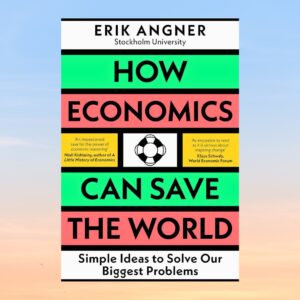This summer, building on our list from last year, we’re offering reading recommendations for people to enjoy wherever and whenever they travel. This is the second in a series of posts to come from our in-house staff and editors. Enjoy.
Sir John Templeton was deeply committed to the idea that people from all walks of life ought to have a firm grasp of the workings and the potential of the free-enterprise economic system. For Sir John, the value of market capitalism had not just to do with the prosperity that it enables, however important that may be, but with the creative possibilities for all persons that it promotes. The freedom to develop one’s skills and talents, take risks, innovate, and collaborate—all while serving the needs of others through a competitive process that drives productivity and the smart use of resources—is a necessary condition of any good society.
Like Sir John, I am also convinced that economics education would go a long way toward helping improve discourse and reasoning in general. My own training was in philosophy, not economics, but I enjoy reading works in economics that are aimed at both general and academic readers. Some of my favorite blogs, like Tyler Cowen and Alex Tabarrok’s Marginal Revolution or Noah Smith’s NoahOpinion substack, are nicely tailored to both laypersons and scholars. The value of economics is how it trains the mind toward employing a logic that, though not always obvious at first glance, has very strong explanatory power for intricate social phenomenon. The “economic way of thinking” demands consideration of opportunity costs, scarcity, incentives, and counterfactuals; offers nuanced views of the secondary and long-term consequences of our actions (consequences that often do not align with intentions); and promotes appreciation for institutions and systems that facilitate complexity and dynamism.
Despite the fact that some critics malign economics as a discipline tout court (perhaps due to failures of bold and simplistic macroeconomic predictions), the economics I most enjoy centers on how economic reasoning can contribute to a fuller picture of human action and motivations, especially when put into conversation with other disciplines across a wide range of situations and contexts. Three books I have read this year, all directed toward popular audiences, do just that:
 Immersion: The Science of the Extraordinary and the Source of Happiness (2022)
Immersion: The Science of the Extraordinary and the Source of Happiness (2022)
By Paul Zak
Zak’s book is a long exploration of the way that “neuroeconomics” helps us understand the features of experiences that are easily forgettable, and of the extraordinary experiences that contribute to satisfying lives—as well as the delicate and necessary interplay between the two.
 The Voltage Effect: How to Make Good Ideas Great and Great Ideas Scale (2022)
The Voltage Effect: How to Make Good Ideas Great and Great Ideas Scale (2022)
By John List
List’s book serves as an important reminder that, when attempting to solve some puzzle, mere intuitions about good ideas are never enough, and it offers practical principles, rooted in economic reasoning, to promote the possibility of greater impact and success for our plans.
How Economics Can Save the World (2023)
By Erik Angner
Angner’s book, despite its somewhat tongue-in-cheek title, focuses on the contributions of economics for addressing everything from individual and minor problems to massive and global problems—and it draws ample insights from philosophy and psychology.
I recommend all three—and not because I agree with every word of each of these books or because I think they are beyond reproach. Most readers will find at least something to criticize. Rather, I recommend them because each book stimulates my thinking, prompts me to ask more questions, and helps refine my appreciation for and facility with the “economic way of thinking.” And, quite frankly, the authors, all of whom are expert scholars, are wonderfully engaging.



